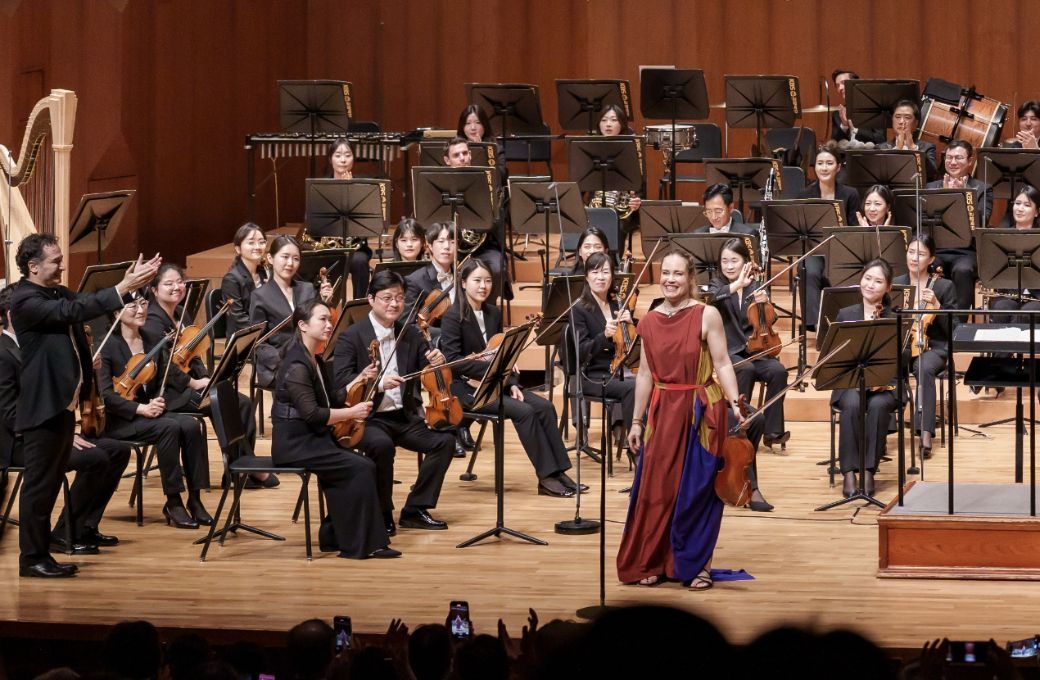
통합검색
05.24 [Backtrack] A night of bold strokes: Orozco-Estrada and Josefowicz light up Seoul Arts Center
- 2025-05-24
A night of bold strokes: Orozco-Estrada and Josefowicz light up Seoul Arts Center
At Seoul Arts Center, an eager audience gathered to witness a compelling programme of Berlioz, Stravinsky and Richard Strauss, presented by the KBS Symphony Orchestra under guest conductor Andr?s Orozco-Estrada. From the outset, the ensemble conveyed an air of anticipation, as if determined to illuminate each composer’s distinct sound world. Orozco-Estrada, known for his kinetic style, took up the baton with confident purpose, setting the tone for an evening of lively contrasts and swift dramatic shifts.

The concert opened with a succinct account of Berlioz, Roman Carnival Overture. Opting for a brisk tempo, Orozco-Estrada imbued the piece with animated flair, drawing crisp articulation from the winds and buoyant energy from the brass. While the strings occasionally receded amidst the more extroverted outbursts, the orchestra preserved the overture’s celebratory essence. The overall impression was one of purposeful drive, even if some finer textural details went by rather quickly.
Soon after, Leila Josefowicz stepped into the spotlight to perform Stravinsky’s Violin Concerto in D. From the recognisable “passport chord”, she distinguished herself through a forthright, contemporary approach, projecting a bright, penetrating tone that seemed to strip each phrase down to its essentials. It was akin to watching a visual artist draw with a dry brush, exposing fresh tonal layers with each stroke. In the Toccata and Capriccio, her incisive attacks underscored the work’s restless energy, while in the two Aria movements she allowed moments of unexpected lyricism to glimmer through. The synchronisation between soloist and orchestra was not always seamless, yet the sense of real-time risk only heightened the performance’s vitality. When the final chords resolved, the audience’s enthusiastic applause suggested deep appreciation for Josefowicz’s candid and intrepid interpretation.
After the interval, Orozco-Estrada guided the orchestra into the elaborate emotional landscape of Richard Strauss’s Don Juan. Determined to navigate the symphonic poem’s complexity with decisive forward motion, he committed to a reading that showcased the work’s shifting moods and surging orchestral waves. As a guest conductor, his strategy of pinpointing pivotal moments and summoning the orchestra’s collective energy proved highly effective. Nevertheless, even though the KBS Symphony Orchestra responded with admirable commitment, there was a noticeable shortfall in the strings’ clarity and overall density of sound. Particularly in the most vigorous passages, the textures occasionally blurred, making it difficult to discern the more delicate nuances. Still, the charged interplay between conductor and ensemble brought Don Juan’s reckless allure to life, highlighting Strauss’s portrait of an unruly spirit.
That same robust dynamism flowed into Richard Strauss’s Der Rosenkavalier Suite. Orozco-Estrada presented the waltz themes on a wide-screen scale, indulging in broad sweeps that underscored the music’s opulence. While some intricately scored transitions might have benefited from greater refinement, the orchestra’s enlivened spirit compensated for those fleeting lapses. Brass and strings engaged in vibrant back-and-forth exchanges, culminating in a brilliant final gesture that drew celebratory cheers from the hall.
Ultimately, this was a night in which urgency and expressive depth took precedence over note-perfect precision. Orozco-Estrada’s incisive leadership, combined with Josefowicz’s daring personality, ensured that each work unfolded with a sense of narrative purpose rather than functioning as a mere demonstration of technical expertise. By the close of the performance, one sensed that the audience’s exhilaration stemmed less from polished execution and more from a shared immersion in the music’s dramatic arc ? elements that lingered as the defining memory of this eventful evening.
이승권 기자

